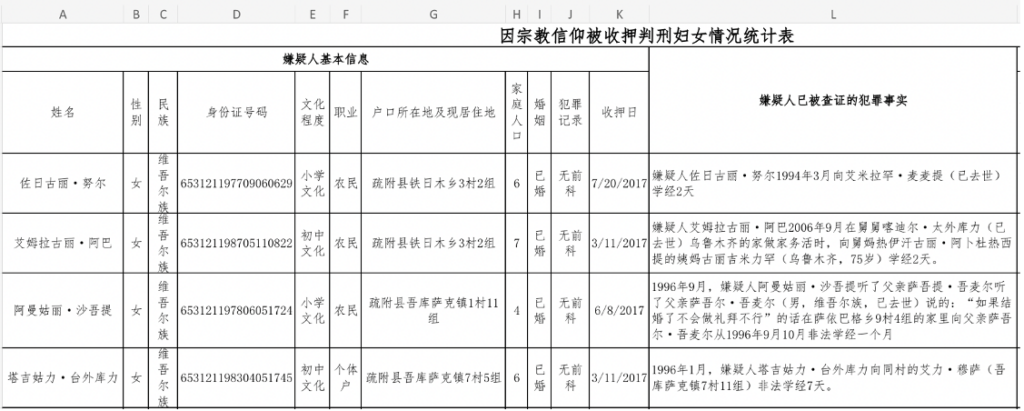A Uyghur Human Rights Project report by Dr. Rachel Harris and Abduweli Ayup. Read our press statement on the briefing, download the full briefing in English, and view a printable, one-page summary of the report.
February 1, 2024, UHRP
I. Key Takeaways
- This report provides detailed evidence that overturns the perception that criminal prosecutions and long prison sentences in the Uyghur Region have been mainly handed down against men.
- Uyghur women are denied freedom of religion and belief. Women’s religious learning and religious gatherings, daily prayer, and wearing the hijab have all been explicitly criminalized.
- State narratives about Uyghur women have consistently denied them agency. Their religious practice has historically been overlooked by the CCP since it was not tied to the mosque. Under the “anti-extremism” campaigns, women who acted as religious teachers and leaders in the community have been portrayed as the dupes of religious extremism.
- Many elderly women, some over the age of 80, have been detained and imprisoned for religious learning that took place 20 or 30 years previously, often when the accused was as young as five or six years old.
- Many sentences were made retrospectively, for “crimes,” such as studying the Quran or wearing a hijab, committed before the practice was deemed illegal.
- 91 women from a single county were detained because they were officially registered by the state as büwi (female religious leaders).
- The detention and imprisonment of female religious leaders and the criminalization of children’s religious socialization—in which women play a significant role—hastens the destruction of Uyghur communities.
- The denial of Uyghur women’s freedom of religion or belief should be understood in the context of other abuses of women’s rights including gender-based violence in detention, forced sterilization and abortion, and forced marriage.
II. Executive Summary
The mass incarceration of women who lead or engage in religious activities and learn or teach religious knowledge has struck at the heart of Uyghur communities, denying agency and free will to hundreds of thousands of women, disrupting the socialization of children and the transmission of culture, and disrupting the normal conduct of births, marriages and deaths.
This report draws on the extensive data contained in the “Xinjiang Police Files,” supplemented by original interviews and other published reports, to document the internment and imprisonment of religious Uyghur women. We highlight the long prison sentences awarded to numerous women for the “crime” of learning a few verses of the Quran during their childhood: the basics needed to fulfill the fundamental Muslim duty of daily prayer. We note the detention of elderly women, the coerced return of Uyghur women from abroad, and the use of intrusive digital surveillance and forced confessions.
In order to contextualize these human rights abuses, we provide a brief historical overview of the relationship between Uyghur women, Islam, and the Chinese Communist Party (CPP). During the 20th century, Uyghur women’s religious practice was largely overlooked in official policy. We trace the shift in policy in 2009 which brought women’s religious affairs more directly under the control of the authorities. This attempt at oversight was quickly overturned by new policies: the wholesale criminalization of women’s religious practice and widespread police harassment of religious families. In 2017, this escalated to mass internment and imprisonment.

This report highlights the intersection between denial of religious freedoms and denial of women’s rights, and argues for the need to consider gender in order to fully understand crimes against humanity. The Chinese authorities claim to be liberating Uyghur women from the shackles of religious extremism and re-educating them for a better future, but the evidence unearthed by this report suggests instead a pattern of removing women from positions of religious and cultural leadership, and subjecting large numbers of women to long periods of imprisonment for their everyday religious practice.

